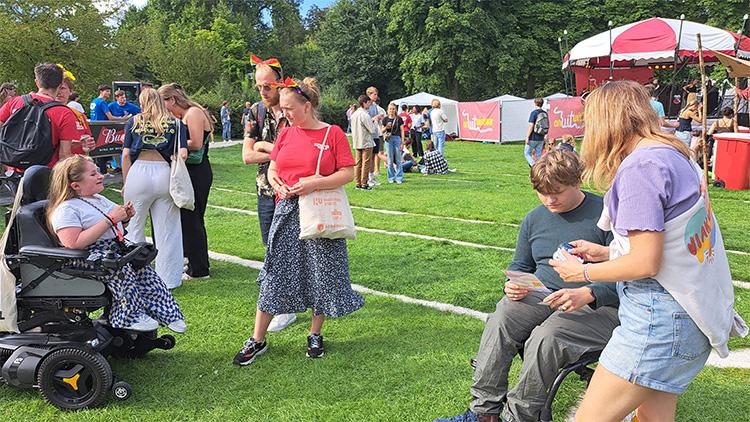Student organisations calling for a more accessible introduction
Student mentors not interested in guiding disabled freshers at UIT

It's UIT's second day and the information market dedicated to student associations is in full swing. Hein is at ViaKunst's stand creating a work of art by throwing darts at balloons with paint in them. He is a wheelchair user and he is going to study History. "So far, so good," he says. "I can go to all the activities I want and I'm having a good time."
The only drawback is that Hein is part of a group of 27 students of which five are disabled and two need extra guidance because they're on the autism spectrum. Although the senior student acting as the group's mentor is enjoying guiding them, she admits that the group is way too big. According to her, she ended up with such a large group because not enough mentors were willing to guide students with special needs.
Eight tips
Last week, student organisations such as ISO, LSVb and the Expertise Centre for Inclusive Education called for more accessible introduction weeks. They decided to sound the alarm after hearing that disabled and neurodivergent students often have a hard time participating in introduction weeks due to inaccessible buildings, intense programmes and social barriers like not understanding what is being said.
The expertise centre and the student organisations underscore that making friends during the introduction week is crucial for students' later wellbeing. "The introduction week is an important time to make new friends and get to know the campus," says the centre of expertise. "Research shows that the first 100 days are essential for a student's progress, their sense of belonging and consequent wellbeing," observes Jorgen Blom from ISO (link in Dutch, Ed.). That's why the expertise centre and the student organisations have come up with eight tips (in Dutch, Ed.) to increase the accessibility of introductory weeks, such as choosing venues that are accessible to wheelchairs, prioritising activities that do not have a lot of stimuli at once, and taking students with visual impairments into account. It is also important for organisers to clearly communicate how students can prepare for certain activities and where they can go if they need extra help.
Additional guidance
"The organisations were quite late with their message," observes Olivia de Gans, a spokesperson for UIT. "Fortunately, we are already doing a lot to increase accessibility." She mentions that students in need of assistance can indicate what kind of additional guidance they need and that the venues are all accessible to disabled students. In addition, the programme comprises both quiet and busy events and UIT is cooperating with Solgu, the urban consultation body for disabled people in Utrecht. Last but not least, the mentors guiding students in need of assistance received extra training.
UIT offers no quiet rooms, nor does it communicate separately with students who are sensitive to stimuli. "However, they can always contact the central point if they have any questions."
Olivia acknowledges that it is hard to get mentors interested in guiding students in need of assistance. "We already offer them extras like additional tokens and more training but, unfortunately, they're not interested, which makes groups a bit larger."
Hein is not attending every single event of the introduction. "I am picking out the most interesting ones. The association fair was high on my list because I do want to join one. I also went to see the debate club and to SIB, the Student Association for International Relations. These organisations seem nice."